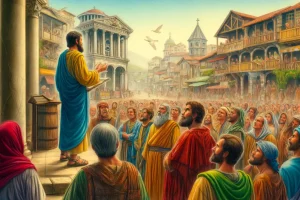
The Book of Job
The Book of Job is a profound and complex text within the Hebrew Bible and the Christian Old Testament, exploring themes of suffering, faith, and divine justice. Here are some concise key facts about the Book of Job:
- Title and Position: Named after its main character, Job, this book is part of the Writings (Ketuvim) in the Hebrew Bible and typically follows the Book of Esther in the Christian Old Testament.
- Authorship and Date: The author of Job is unknown, and the date of composition is also uncertain, with suggestions ranging from the 6th century BC to the 4th century BC. Some scholars propose even earlier origins based on its language and thematic content.
- Structure and Content: The book can be broadly divided into several parts:
- Prologue (Chapters 1-2): Job’s piety and prosperity are described, followed by a heavenly wager between God and Satan that results in Job’s intense suffering.
- Dialogues (Chapters 3-37): Job debates with his three friends—Eliphaz, Bildad, and Zophar—who insist that his suffering must be due to sin, despite Job’s claims of innocence.
- Job’s Monologue and Elihu’s Speeches (Chapters 29-37): Job laments his misery and maintains his integrity, followed by speeches from Elihu, a younger bystander who criticizes both the friends for failing to prove Job’s guilt and Job for justifying himself rather than God.
- God’s Response and Conclusion (Chapters 38-42): God speaks to Job out of a whirlwind, questioning him and demonstrating the limits of human understanding. Job acknowledges God’s omnipotence and repents, leading to his restoration of fortune and family.
- Main Themes:
- The Problem of Suffering: Job addresses the question of why the righteous suffer if God is just, exploring complex theological and philosophical issues.
- Divine Justice and Human Knowledge: The book challenges conventional wisdom about retributive justice and highlights the limitations of human knowledge.
- Faith and Integrity: Job’s perseverance in faith, despite his inexplicable suffering, is a central theme.
- Theological Significance:
- The Book of Job is often seen as a counter-narrative to the simplistic notion that good is always rewarded and evil punished. It delves deep into the nature of God and the appropriate human response to suffering.
- It emphasizes that God’s ways are inscrutable and that human beings must trust in divine wisdom and sovereignty.
- Modern Relevance: Job’s story resonates with modern readers grappling with the presence of evil and suffering in the world, providing a framework for understanding and persevering through personal trials.
The Book of Job is one of the most profound and challenging books in the Hebrew Bible and the Christian Old Testament, grappling with deep questions about suffering, divine justice, and human righteousness. It stands out for its literary complexity and its exploration of theodicy, the defense of God’s goodness and omnipotence in view of the existence of evil. Here’s a detailed analysis of the Book of Job, encompassing its structure, content, major themes, and theological significance.
Structure and Content
1. Prologue (Chapters 1-2):
- The narrative begins in a prose form, introducing Job as a wealthy and pious man. Satan challenges Job’s integrity, suggesting that his piety is due to his prosperity. God allows Satan to test Job, resulting in the loss of his property, children, and health. Despite this, Job remains steadfast in his faith, refusing to curse God.
2. Dialogues Between Job and His Friends (Chapters 3-37):
- Job’s Lament (Chapter 3): Job curses the day of his birth, initiating a series of dialogues with his three friends—Eliphaz, Bildad, and Zophar—who argue that Job’s suffering must be a punishment for sin, advocating a traditional view of divine justice.
- Three Cycles of Debates: The friends insist that all suffering is a result of wrongdoing, while Job maintains his innocence and begins to challenge the righteousness of God’s actions, feeling tormented by the apparent injustice.
- Elihu’s Intervention (Chapters 32-37): A younger bystander, Elihu, criticizes both the friends for failing to prove Job’s guilt and Job for justifying himself rather than God. He introduces the idea that suffering might be allowed by God to refine and prevent more sin.
3. God’s Response and Conclusion (Chapters 38-42):
- God’s Challenge (Chapters 38-41): God answers Job out of a whirlwind, questioning him about the creation and management of the world, emphasizing His wisdom and sovereignty, and challenging human ability to understand divine ways.
- Job’s Humble Submission (Chapter 42): Job repents for his words, recognizing his limitations. Subsequently, God restores Job’s fortunes, giving him twice as much as before, and blesses his latter years more than his former.
Major Themes
1. The Problem of Suffering:
- Central to the Book of Job is the question of why the righteous suffer. The narrative disentangles the relationship between sin and suffering, challenging the retributive justice perspective.
2. Divine Justice and Sovereignty:
- Job confronts the nature of God’s justice, questioning the divine governance of the world in light of his undeserved suffering. God’s speeches reaffirm His sovereign control and wisdom, asserting that divine governance often transcends human understanding.
3. Human Perspective and Divine Perspective:
- The contrast between human and divine perspectives is stark. Job and his friends operate with limited knowledge, while God’s speeches introduce a cosmic dimension to the discussion of justice and suffering.
4. Integrity and Faith:
- Job’s integrity is tested but not broken. His persistent faith, even when he does not understand his suffering, underscores a profound narrative about human loyalty to God despite circumstances.
Theological Significance
The Book of Job is not merely about suffering; it’s a theological exploration of how humans relate to God when faced with inexplicable pain. It presents a robust challenge to simplistic doctrines of reward and punishment, inviting a more nuanced understanding of God’s purposes.
Conclusion
The Book of Job remains one of the most theologically rich and existentially resonant books in religious literature. It offers no easy answers but deepens the reader’s appreciation for the complexity of faith in the face of suffering, highlighting themes of trust, humility, and the profound mystery of divine will.
Tag:Bildad, cosmic order, Creation, debates, divine justice, divine sovereignty, divine-human relationship, Elihu, Eliphaz, existential questions, Faith, God, Hebrew Bible, human righteousness, integrity, Job, lamentation, moral philosophy, Old Testament, patience of Job, poetic dialogues, prosperity, restoration, Satan, suffering, tests, theodicy, whirlwind, wisdom, Zophar



